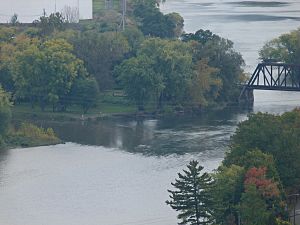Conewango Creek facts for kids
Quick facts for kids Conewango Creek |
|
|---|---|
| Country | United States |
| Physical characteristics | |
| Main source | New Albion Lake New Albion, New York 1,238 ft (377 m) 42°5′30″N 79°8′11″W / 42.09167°N 79.13639°W |
| River mouth | Warren, Pennsylvania 1,181 ft (360 m) 41°50′28″N 79°08′43″W / 41.8411708°N 79.1453223°W |
| Length | 71 miles |
| Basin features | |
| River system | Allegheny River |
| Basin size | 896.5 square miles (232,200 ha) |
The Conewango Creek is a 71-mile-long (114 km) stream that flows into the Allegheny River. It runs through parts of Pennsylvania and western New York in the United States.
This creek collects water from a large area, including much of southeastern Chautauqua County, New York, and western Cattaraugus County, New York. Its most important branch is the Chadakoin River, which brings water from Chautauqua Lake into the Conewango Creek. A high land area called the Chautauqua Ridge forms the northern and western edges of the creek's watershed (the area of land that drains into the creek).
Contents
Journey of Conewango Creek
The Conewango Creek starts its journey at New Albion Lake in New Albion, New York. From there, it takes a winding path through much of western Cattaraugus County.
It then meets up with the Chadakoin River in Frewsburg, New York. After this meeting, the creek flows south into Pennsylvania. Finally, the Conewango Creek joins the larger Allegheny River in the city of Warren, Pennsylvania.
Changes to the River
Over the years, some changes have been made to the Conewango Creek to help its environment and make it safer.
Removing Old Dams
On September 26, 2009, an old dam from the Civil War era was taken out of the Conewango Creek in the city of Warren. This dam was a "low head dam," which means it was not very tall. Removing it was a big deal because it allowed fish to travel freely from the Allegheny River all the way up into the Conewango Creek's upper parts. This helps fish find new places to live and lay eggs.
Later, from August 25 to September 4, 2014, two more old dams were removed from the Conewango Creek in North Warren, Pennsylvania. One of these was also a low head dam, similar to the one removed in 2009. It was known as the Hospital Dam because it used to provide water to the Warren State Hospital. The second dam was made of rock and wood and was right upstream from the Hospital Dam.
With these dams gone, the entire 71 miles (114 km) length of the Conewango Creek is now free-flowing. This means there are no dams blocking the water's path. This change has greatly improved the natural health of the Conewango Creek and its surrounding area. Removing the dams also made the creek safer for people and helped connect areas for freshwater mussels to thrive.
Conewango Creek: River of the Year 2015
On January 16, 2015, the Conewango Creek was announced as the winner of the 2015 Pennsylvania River of the Year contest! This is an annual competition run by the Pennsylvania Department of Conservation and Natural Resources and the Pennsylvania Organization for Watersheds and Rivers since 1983. People from the public could vote online for their favorite river from November 10 to December 15, 2014.
The group that nominated the Conewango Creek and helped it win was the Conewango Creek Watershed Association. This is a non-profit group based in North Warren, Pennsylvania. They received a $10,000 grant (a sum of money given for a specific purpose). They planned to use this money to teach people about the creek's history, the animals that live there, local fishing, and other interesting topics.
They also planned other fun activities like:
- A "poker run" (a type of scavenger hunt).
- A special fall celebration.
- A creek cleanup event.
- A photo contest.
- Public water safety courses.
The association also wanted to start a program where people could become "stream ambassadors" to help protect the creek.
Amazing Wildlife of Conewango Creek
The waters of the Conewango Creek are home to many interesting creatures, including some rare fish species.
Rare Fish and Other Animals
- The burbot is a fish that was once common in the upper parts of the Allegheny River. People thought it had disappeared from the area, but it has been found living in the Conewango Creek!
- The paddlefish is another native fish that was recently brought back to live in the area.
Besides these special fish, the creek is also home to 19 different types of native freshwater mussels. It's a place rich in biodiversity, meaning many different kinds of life thrive there. You might also spot:
- River otters
- Bald eagles
- Ospreys
- Herons
- And many other types of wildlife!


